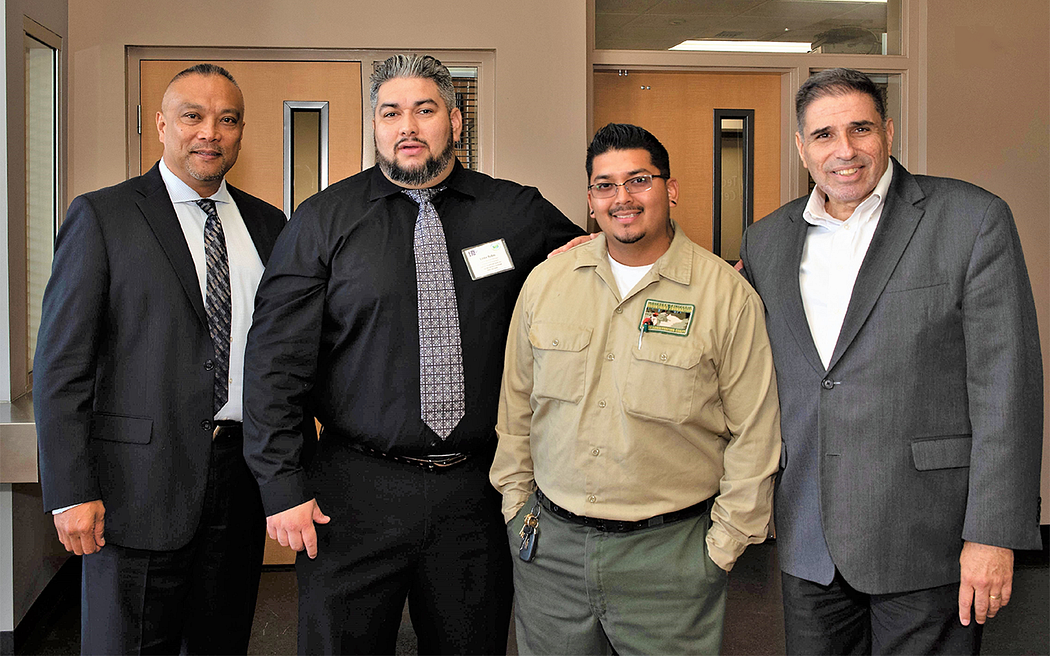Getting sent to prison at the age of 18 was a wake up call for Paul Soto. He spent 10 years locked up, but he said it gave him time to imagine the life he wanted.
“Once you get your life almost taken away, you feel it,” said Soto, 29, who grew up in Rialto. “Now that I’m out I try to make up for it.”
He has had to work hard, save money, skip the parties and stay away from people who are not ready to lead a life of work. He is building a relationship with two sons, 12 and 10, who were too young to know him when he was arrested.
He said the ladder up for him was the Caltrans Transitional Work Project by the California State Reentry Initiative. Founded in 2010, it provides court-mandated classes, life skills and job development, all under the supportive leadership of the Urban Conservation Corps, the California Department of Transportation and the California Department of Corrections and Rehabilitation. The San Bernardino Community College District has been part of the team for the past six years.

“They are each on an individual track,” explained Eddie Rubio, who has worked as a leader in the program since 2013, based at the San Bernardino Community College District. There are currently 62 people in the program, mostly men. Some years the program has served as many as 145 participants. Rubio helps to assess their readiness and connect them to the right resources.
“It is a huge asset to have access to SBCCD workforce training programs,” he said. “We offer classes like welding, or warehouse logistics or construction.” At the same time, people in the program work with Caltrans on crews that do highway maintenance, trimming trees, picking up litter and repairing irrigation lines. It is hard work, but a good way to underline the importance of showing up on time and taking direction.
In his six years with this project, Rubio said he has worked with 570 participants and 256 of them were able to find full-time permanent employment through the program. He estimates that the effort has saved California taxpayers more than $20 million.
“I develop a relationship with each person,” said Rubio, who earned a bachelor’s degree in criminal justice at Cal State University of San Bernardino to prepare for a career that he calls a mission rather than just a job.
He said his immigrant parents instilled a strong work ethic in him. “All my siblings chose a career path like this,” he said. “My brother is a firefighter in Riverside. My sister is a caseworker and family therapist in Victorville. I chose Reentry Services.”

Need welding skills? Rubio can help get you trained. Dream of working construction? Rubio reaches out to his partners. Need interview practice? There’s a program for that. Each participant has to apply and earn a job. And the program works. They typically land a job with Caltrans, Cal Fire, or the U.S. Forestry Service. Some work in warehouses, as welders and in other jobs that keep them outside and working hard.
Only 2.9 percent of the participants end up back in prison, a big improvement over California’s typical 60 percent recidivism rate.
Rubio says there is a lot of credit to spread around. Community resources like Goodwill and 2–1–1, an organization that provides referrals for resources, especially for the reentry population, have been willing to be partners.
“The program is the safety net,” Rubio explains. If they get a job they go off to that job. But if that job ends suddenly, they can come back and continue the program. We are trying to get them placed before their 90 day mark.” But some people need more time than that. Over his five years with the program, Rubio says he has seen a few people fail. He tries not to take it personally. “I’m a little greedy,” he said. “I want to help everyone I come across.”
The proof is in stories like Soto’s. He has bought himself a car, is visiting with his sons and earned a full time job with the Urban Conservation Corps. In November, he stepped up to a full time job with Caltrans. “The CSRI was very important for me,” Soto said.
“I make five goals, I meet them, and then I set another five goals,” Soto said. “If you work hard, things will work out.”
He said one day he wants to mentor other people who have experienced prison.
“People can change,” he said. “People can heal themselves, if they are willing to work hard, If they are willing to think long term, if they are willing to adapt and adjust to anything.”
